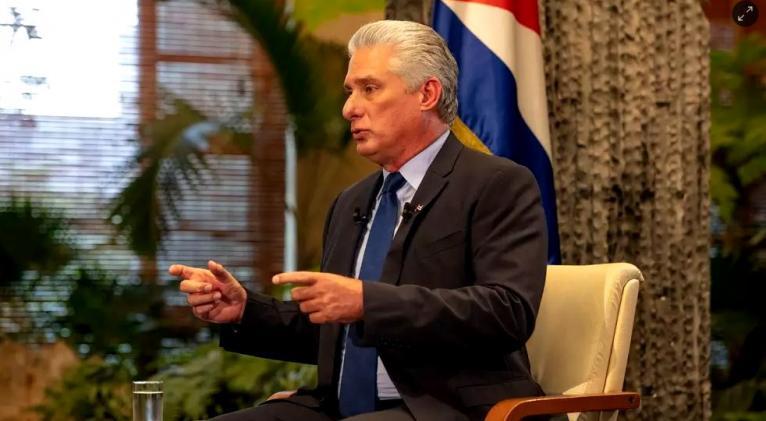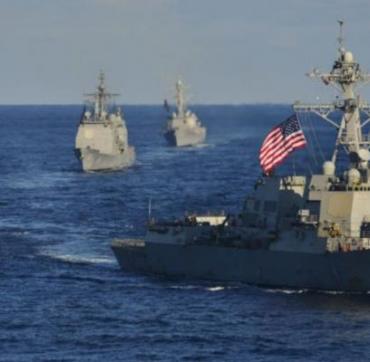Díaz-Canel: “Biden government opted to remain faithful to the aggressive approach championed by Trump” (I)
especiales

Cuba, a nation of slightly over 11 million inhabitants, is always making headlines. However, we do not usually contact their leaders. Miguel Díaz-Canel, the first President born after the Cuban Revolution, granted an interview to *El Público*, his first interview ever to a Spanish media since he came to power. He talked about the island’s current affairs in an interview arranged in Havana, which was then answered in writing.
The Cuban president refers to the conflict underlying behind the accusation of Cuba sponsoring terrorism, denounces the similarity of the anti-Cuban policy of Biden and Trump, explains the country’s economic situation post-pandemic era and analyzes its recent meetings with Vladimir Putin and Xi Jinping.
One of the main diplomatic conflicts between Cuba and the United States under the presidency of Donald Trump was the accusation of sonic attacks against the personnel of the US embassy in Cuba, which caused US diplomats dizziness and nausea, among other symptoms. Investigations have recently concluded that there is no responsibility of a foreign government in the event and that there were no weapons behind these events.
Those accusations against Cuba led to the implementation of sanctions, including the indefinite cancellation of visas for Cubans. What has happened after the recognition that the Government of Cuba is not behind it?
In my opinion, it would be wrong to label it as a diplomatic conflict. It was a slanderous operation designed by the US Government with a very clear political objective.
It is known that the step taken by the Obama government to establish diplomatic relations with Cuba and move towards a more constructive and respectful ties had majority support in the US, even among people of Cuban origin.
To undo this, as the Trump government aimed to once he came to power, it was essential to start discrediting the state of relations, also discrediting our country, and rebuilding the narrative of Cuba as a hostile state. That is the essence of the problem.
Consequently, the accusatory narrative has only been enriched with new smears to justify a return to an aggressive political approach against Cuba and the imposition of additional coercive measures.
Hence, the key issue here is not the sanctions or the initial coercive measures with the specific context of the health symptoms, but everything that followed that first event.
The US own intelligence agencies have eventually denied the slanders on the alleged attacks and confirmed what Cuba and most of the US scientific community and other nations around the world had already stated. However, the stance of a hostile policy remains and prevails in the approach of the current US government.
Its media nature is quite evident and we can all see it in the label itself: “Havana Syndrome.” Later, dozens of US diplomats appeared in other countries complaining of the same symptoms and the label was also denied, but the farce was already set, targeting Cuba without a single serious evidence of the accusations.
The truth always triumphs, but until that time comes, the lie does its job of disrupting everything and becomes a pretext for a criminal policy that not even the truth has been able to undo.
The Trump government, at the end of its term, included Cuba on the list of countries that sponsor terrorism (Cuba was not part of that list since 2015). What significance does it have for the country?
Aggressive anti-Cuban sectors put a lot of pressure on Trump to include Cuba on that list since he took office and he seems to have weathered the storm until the very last moment. It took so long to do so that, in practice, it has been the government of Biden the one responsible for enforcing these measures.
It is a markedly aggressive step and of great importance. It is not just an unacceptable slander showing the US opportunistic approach to the scourge of terrorism. Such designation causes a threatening effect against the banking and financial institutions of almost all countries and leads them to refuse any sort of relations with nations marked by such stigma. And that is precisely the case of Cuba.
And actually, it has caused us to lose the relationship with an important group of banking and financial institutions in many parts of the world, and it makes difficult for us to establish links with others for the development of our economy. This makes our commercial activity extremely difficult, hinders the work of payments and collections, makes imports more expensive, and limits credit possibilities.
All these translate into shortage, breach of financial commitments, difficulties to source inputs for our industry, our service and the people’s consumption. Simultaneously, discourage foreign investment and even limit international cooperation.
The impact is mainly on business economic activity, but also on individuals when they travel and need to make payments or transactions outside of Cuba.
It is an infamous but yet real paradox: the sponsors of terrorism against Cuba have the cynicism to accuse Cuba of sponsoring terrorism.
In a surprising move, the Democratic Biden Administration renewed that consideration last February 28. The presence of spokesmen for the National Liberation Army (ELN) in Cuban territory was one of Biden’s justifications. What do you have to say about it?
Cuba’s designation on that list has nothing to do with the issue of terrorism. It is an instrument of economic coercion. Terrorism, the presence or non-presence of an ELN delegation in Cuba is nothing more than a pretext. It makes no sense trying to understand such an overtly opportunistic political act.
Colombia’s last government ventured into hostile actions against Cuba; for instance, public statements, threats and summons, by means of manipulation, politically motivated and ungrateful, about the uncontested contribution of Cuba to the peace process of Colombia.
For example, the same day the United States announced that Cuba was to be included on the list of countries that allegedly do not fully cooperate with the United States efforts against terrorism, the High Commissioner for Peace of the Duque government publicly declared that the decision of the US State Department of including the island on that list provided a strong backing to the efforts of Colombia and its “insistent request" for Cuba to hand over the members of the ELN peace delegation.
The conduct and actions of the Duque Government, in collusion with anti-Cuban sectors in the United States, provided the Trump Government with pretexts to intensify the economic, financial and commercial blockade against Cuba and the illegitimate designation of Cuba as a State Sponsor of Terrorism that causes enormous costs and serious humanitarian consequences for our people.
Nonetheless, since August 12, 2022, the new Government of Colombia recognized that the ELN delegation in Cuba was legitimate and that it was its interlocutor. In fact, the first meeting between the new Government of Colombia under led by President Petro and the ELN was held in Havana that day, precisely when the Foreign Minister and the new High Commissioner for Peace of that country visited us. From that moment on, the agreed protocolsfor the reinstatement of the Peace Dialogues Table were complied with.
This was done together with the guarantors of Norway, the Special Representative of the UN Secretary General in Colombia and the Colombian Episcopal Conference.
In October 2022, the members of the ELN Dialogue Delegation who remained in Cuba withdrew from the national territory, in compliance with an agreement between the National Government of Colombia and the ELN, before the guarantors of Norway, Venezuela, and Cuba.
And it was decided to reinstate the Roundtable for Peace Dialogues between the Government of Colombia and the ELN.
The Government of Colombia lifted the arrest warrants and suspended the notifications of international cooperation requests and Interpol alerts of the members of the Peace Delegation of the National Liberation Army (ELN) and decided to annul the extradition requests made to Cuba on members of said delegation who remained on the island.
These members of the ELN traveled to Venezuela, Mexico to meet the Government of Colombia and other six countries and they are now in Cuba. Fortunately for the people in Colombia and all Latin America and the Caribbean, the Roundtable of Dialogues closed its third cycle a few days ago here in Havana, with major agreements on the engagement process of theCo lombian society in peacebuilding and the bilateral, national and temporary cease of fire.
And despite of the development of the peace negotiations between the Government of Colombia and the ELN, the US stance against Cuba continues.
Yet, the US have not changed a comma to its case to keep us on the spurious list. I believe the specialists who truly fight against terrorism must be ashamed.
As of Cuba, our actions are true to ethics, to the protocols we signed. We are a nation that once we pledged our word, we keep it. And we are a nation with a painful record list of victims of terrorism.
It seems evident that, unlike Obama, the Democratic Biden Administration has not opted to ease the sanctions and the blockade against Cuba and maintains almost all of Trump's measures. Why this difference between two Democratic presidents?
It is a very frequent and logical question. Even American politicians pose the same question. Deciphering it would lead, perhaps, to a more comprehensive understanding of the characteristics and games of the American political system.
What indeed is clear is that the Biden government opted to remain faithful to the aggressive approach championed by Trump and disloyal to the course set by the government of Obama, of which Biden himself was part of when he was vice president.
It is also clear that there has been a gamble on the collapse of the Cuban economy since the current government came to power. This explains the tightening of the US blockade during the pandemic and the misleading statements about an alleged revision of Trump's policy, while the most damaging and representative elements of that policy were rigorously enforced.ersity is the resort of imperial policy when it finds an adversary who does not give up. Republicans or Democrats have supported that policy for 200 years.
Translated by Sergio A. Paneque Díaz / CubaSí Translation Staff














Add new comment